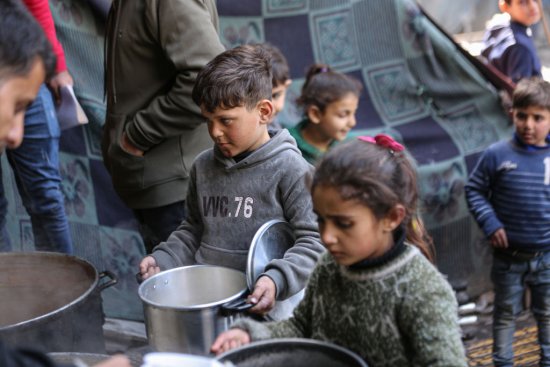
According to a new U.N.-backed report, famine could unfold in northern Gaza anytime between now and May.
For months, aid agencies and world leaders have warned about the risk of famine in Gaza, where normal flows of food and water have slowed to a trickle since Oct. 7. In northern Gaza, where roughly 300,000 people remain without adequate access to humanitarian aid, it may already be present, according to a new report backed by a consortium of U.N. bodies and relief agencies known as the Integrated Food Security Phase Classification Initiative, or IPC, which projects that famine in the north could unfold anytime between now and May.
[time-brightcove not-tgx=”true”]The latest analysis from the IPC, which uses a five-phase index to assess food insecurity ranging from minimal (phase 1) to catastrophe (phase 5), reports that nearly 677,000 of Gaza’s 2.2 million population are currently experiencing catastrophic hunger. In the IPC’s most-likely scenario, which assumes an escalation in the conflict involving Israel’s anticipated offensive on Gaza’s southernmost city of Rafah, that figure is expected to rise to 1.1 million—placing roughly half of Gaza’s population under the most severe phase—between now and July.
“This new report shows that the catastrophic levels of hunger and starvation in Gaza are the highest ever recorded on the IPC scale, both in terms of number of people and percentage of the population,” Sally Abi Khalil, Oxfam’s Middle East and North Africa Regional Director, said in a statement. “Never before have we seen such rapid deterioration into widespread starvation.”
While hunger crises aren’t uncommon around the world, declarations of famine—which the IPC defines as “an extreme deprivation of food,” in which starvation and extremely critical levels of acute malnutrition are evident—are rare. Since the IPC was created in 2004, it has only identified two famines: in Somalia in 2011, and in South Sudan in 2017. The IPC has never identified a famine in the Middle East. Emily Farr, the food and economic security lead at Oxfam, one of the 19 organizations involved in the IPC, tells TIME that although the IPC itself doesn’t issue formal declarations of famine, “if or when a famine is classified by the IPC, and the findings have been confirmed by an independent body of experts called the Famine Review Committee, then stakeholders in the country such as U.N. leadership are responsible for declaring a famine based on the IPC analysis findings.”
The IPC has identified two key drivers of the hunger crisis in Gaza. The first is the ongoing bombardment of the Strip, which has killed more than 30,000 people and destroyed critical infrastructure such as food, health, and water systems. The second is the ongoing restriction of vital humanitarian aid, only a fraction of which is currently getting into the Strip as a result of impediments to land deliveries. Last-ditch efforts by the U.S. government and others to deliver food aid by air and sea have proven an insufficient substitute.
The result has been particularly catastrophic for Gaza’s youth. At least 27 children died in northern Gaza in recent weeks as a result of malnutrition, according to Gaza’s health ministry. Should the crisis continue to escalate, up to nearly half (45%) of all children in Gaza aged 5 and under could suffer from acute malnutrition by August, according to a recent report from the London School of Hygiene and Tropical Medicine and the Johns Hopkins Center for Humanitarian Health.
“Seeing the numbers of people facing imminent famine in Gaza is shocking and unprecedented,” Sam Duerden, the U.S.-based International Rescue Committee’s team lead for occupied Palestinian territory, said in a statement. “Children are starving due to an entirely manmade and preventable crisis. There is no excuse.”
Read More: Unsafe, Ineffective, Undignified:’ Why Food Airdrops Are Falling Short in Gaza
The prospect of famine has prompted sharp criticism from world leaders, among them Israel’s closest allies. “We cannot stand by and watch Palestinians risk starvation,” German Chancellor Olaf Scholz said on Sunday following a meeting with Israeli Prime Minister Benjamin Netanyahu in Jerusalem. That sentiment was echoed by European Commission President Ursula von der Leyen in Cairo, who stressed the need for a rapid ceasefire agreement. E.U. foreign policy chief Josep Borrell urged Israel to open up more land routes for aid distribution into Gaza, dubbing the hunger crisis “entirely manmade.”
But it’s also preventable. The IPC notes that “famine can be halted,” but that it will require putting an end to the hostilities and ensuring the safe delivery of humanitarian assistance.
“There is a very small window left to prevent an outright famine and to do that we need immediate and full access to the north,” Cindy McCain, the executive director of the World Food Programme, said in a statement. “If we wait until famine has been declared, it’s too late. Thousands more will be dead.”